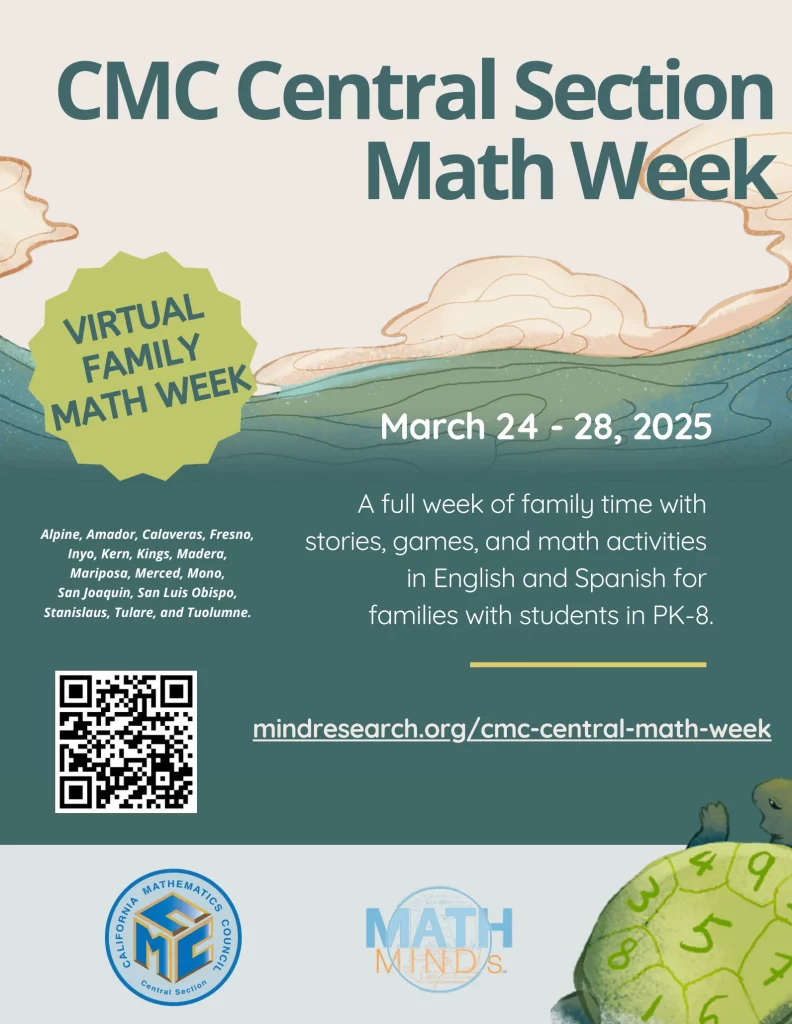UPDATED 3/24/2025: Changed the flyer for the 2025 Math Week.
There is substantial evidence that throughout the school years children benefit when parents are involved in their learning. What more could a school want than parents who are actively involved in supporting their children at home with their math homework?
Well…it turns out the answer to that question is a bit more tricky that you might imagine.
There was a big study that looked at kids in first and second grade to see if parents stressing about math affected how well their kids did in math. They were trying to figure out why some kids struggle more with math than others. They checked if parents freaking out about math could tell us something about how their kids did in math over the school year.
Turns out, when parents are really anxious about math, their kids don’t learn as much math during the year and end up feeling more stressed about it by the end of the school year. This transmission of math anxiety from the adult to the child only happens if those math-worried parents are always helping out with math homework. Interestingly, if parents didn’t jump in to help with math homework all the time, their kids’ math skills and attitudes didn’t seem to be affected by how anxious the parents were about math.
Also, the study found that parents’ math stress didn’t seem to have anything to do with how well their kids did in reading. This suggests that all the fuss about math from parents specifically affects their kids’ math skills and not other subjects like reading. So basically, this study shows there’s a way that parents’ own worries about math can pass down to their kids, making them less confident in math and more stressed out about it.
So what can ALL parents do to support their kids at home with mathematics WITHOUT causing math anxiety?
Try Bedtime Math. Just as we know the amazing benefits of parents reading to their children as part of the bedtime routine, it turns out that Bedtime Math is also wonderfully beneficial for children. Bedtime Math sends parents a fun, new math problem every day, on everything from electric eels to chocolate chips to flamingoes. Targeted for kids ages 3-9, it begins with a short, fun set-up story, followed by three math problems at three levels of challenge. 
This app is entirely free and is available in English and Spanish. Initial results from a longitudinal study led by University of Chicago psychologists published in Science found that in one school year, kids whose families used the Bedtime Math app as little as once a week improved their math achievement on average by three months more than children who didn’t. Most notably, kids of the most math-anxious parents gained an extra half school year of skills.
Later findings published in the Journal of Experimental Psychology showed that the Bedtime Math app had lasting effects.
To further support family engagement, the MCOE Math Team is partnering with California Math Council (Central Region) to co-sponsor Family Math Week from March 24th-28th. This is a FREE, virtual TK-8 family math week offered to the families of the Central California Valley. The puzzles were created by the MIND Research Institute with all activities being available in both English and Spanish. Many of the puzzles begin with a short story to introduce the gameplay.
Our goal is to accumulate one million family math minutes, and your support in sharing this link and this flyer with your network would be invaluable in achieving this milestone.
If you are a teacher, please consider offering this to your students and their families!
In conclusion, while there are many causes of math anxiety, this blog post focuses on just one – parents – and how even the most anxious parents can avoid transmitting math anxiety to their children. The answer is to focus less on homework and more on Bedtime Math and games and puzzles.
.
.
.

